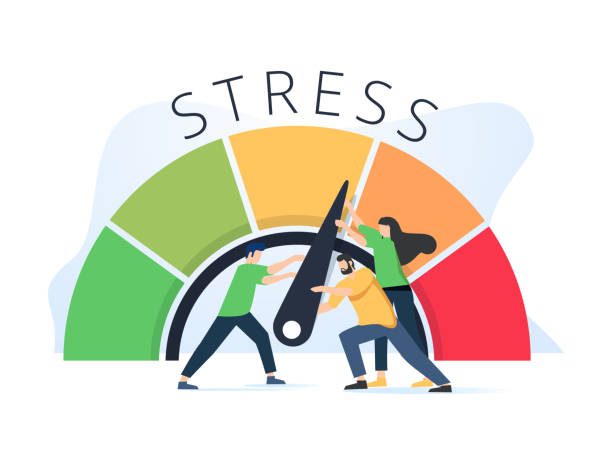This content is for informational and educational purposes only. Always consult a qualified healthcare provider.
Last Updated on January 24, 2024 by Grace Oluchi
Stress is a common experience in our daily lives. It can be caused by various situations, such as work, relationships, finances, and health issues. While some is normal and even necessary for motivation and growth, chronic ones can have negative effects on our physical and mental health. In this article, we will explore the effects of stress on the body and how to manage it.
📋 Table of Contents
What it is Stress.


Stress is a natural response to a perceived threat or challenge. It is the body’s way of preparing for a fight or flight response. When we experience it, the body releases hormones such as cortisol and adrenaline, which increase heart rate, blood pressure, and blood sugar levels. This response is helpful in short-term situations, but chronic stress can have negative effects on the body.
The Effects of Stress on the Body.
Stress can have a variety of negative effects on the body, including:
- Cardiovascular System: Chronic stress can lead to high blood pressure, which increases the risk of heart disease and stroke. It can also contribute to the development of atherosclerosis, a condition in which plaque builds up in the arteries, reducing blood flow to the heart and other organs.
- Immune System: Chronic stress can weaken the immune system, making it more difficult for the body to fight off infections and illnesses. It can also lead to chronic inflammation, which has been linked to a variety of chronic diseases, including autoimmune diseases, cancer, and heart disease.


- Digestive System: Chronic stress can lead to digestive problems such as stomach ulcers, irritable bowel syndrome (IBS), and acid reflux.
- Musculoskeletal System: Chronic ones can lead to muscle tension, which can cause headaches, neck pain, and back pain.
- Reproductive System: Chronic stress can disrupt the menstrual cycle in women and reduce fertility in both men and women.
- Mental Health: Chronic stress can lead to anxiety, depression, and other mental health issues. It can also contribute to substance abuse and addiction.
You May Also Read
- Benefits of regular physical activity on mental health.
- Untangling Diabetes: Your Comprehensive Guide to Understanding, Diagnosing
- Safeguarding Your Mental Health and Wellness in 2024.
- Sleep Your Way to Better Health: Understanding the Importance
- Social Media: How to Use it Safely.
Managing Stress.


Managing it is essential for maintaining good physical and mental health. There are several strategies that can be used to manage stress, including:
- Exercise: Regular exercise can help to reduce it and improve overall health. Exercise releases endorphins, which are natural mood boosters. It can also help to reduce muscle tension and improve sleep quality.
- Relaxation Techniques: Relaxation techniques such as deep breathing, meditation, and yoga can help to reduce it and promote relaxation.
- Time Management: Effective time management can help to reduce it by prioritizing tasks and reducing feelings of overwhelm.
- Social Support: Having a strong support system, such as family and friends, can help to reduce it and provide a sense of belonging.
- Cognitive Behavioral Therapy (CBT): CBT is a type of therapy that focuses on changing negative thought patterns and behaviors. It can be an effective treatment for anxiety and depression.
- Medication: In some cases, medication may be necessary to manage it and related mental health issues. Antidepressants and anti-anxiety medications can be effective in reducing symptoms.
- Self-Care: Engaging in self-care activities such as getting enough sleep, eating a healthy diet, and engaging in enjoyable activities can help to reduce it and promote overall wellbeing.
The Key Takeaway.
Stress is a common experience, but a chronic one can have negative effects on the body and mind. It is important to manage it through various strategies such as exercise, relaxation techniques, time management, social support, CBT, medication, and self-care. By prioritizing stress management, we can improve our overall health and wellbeing.
What are the physical effects of stress on the body?
Stress can affect different parts of the body, including the heart, digestive system, immune system, and reproductive system. It can lead to high blood pressure, irritable bowel syndrome, weakened immune system, and fertility problems. Recognizing these physical symptoms is crucial in mitigating the effects of stress on the body.
How does stress affect mental health?
Stress can also affect mental health, leading to anxiety, depression, and other mood disorders. It can affect our ability to concentrate and make decisions, and can even lead to more severe mental health issues if left unaddressed. It’s important to take mental health seriously and seek help when needed.
What are some effective ways to manage stress?
There are many effective ways to manage it, including exercise, meditation, deep breathing, and journaling. It’s important to find what works best for you and to make stress management a priority in your daily routine.
How does diet affect stress levels?
Diet can play a significant role in managing stress levels. Eating a balanced diet with plenty of fruits, vegetables, and whole grains can help regulate its hormones and reduce inflammation in the body. Avoiding caffeine and alcohol, which can increase stress levels, is also important.
When should I seek professional help for stress?
If stress is significantly impacting your daily life and you are unable to manage it on your own, it may be time to seek professional help. A mental health professional can help you develop coping strategies and provide additional support to manage it effectively.

